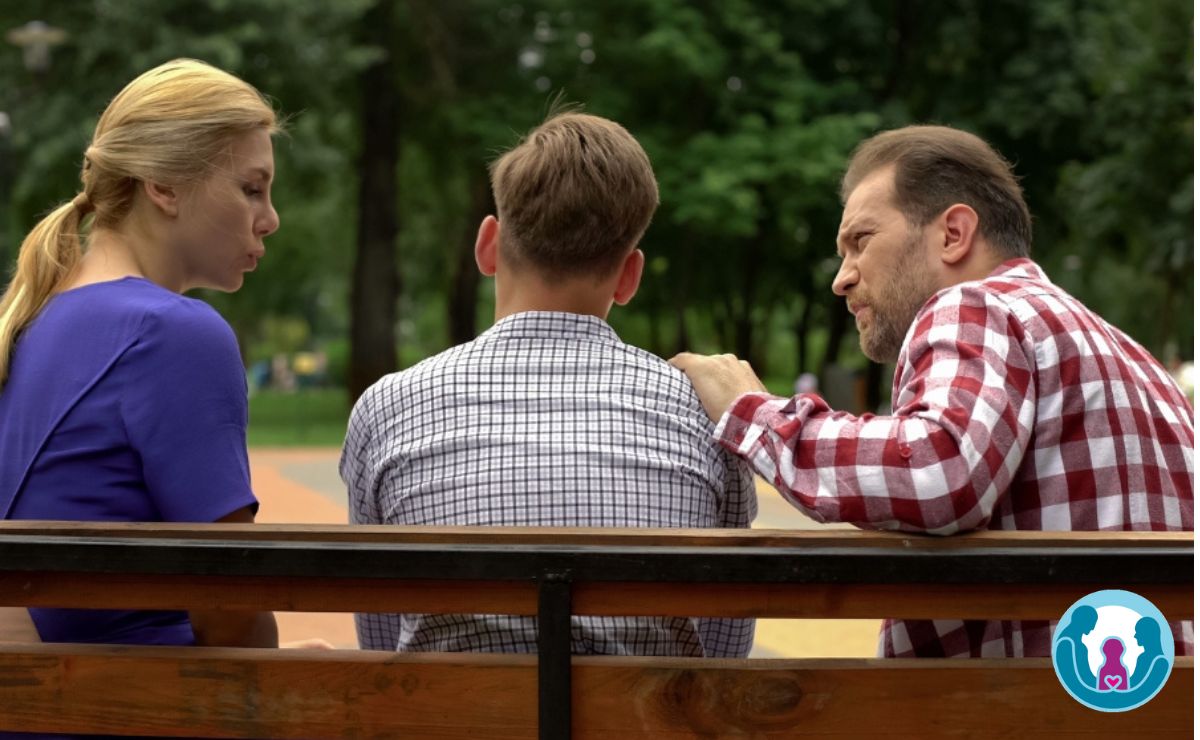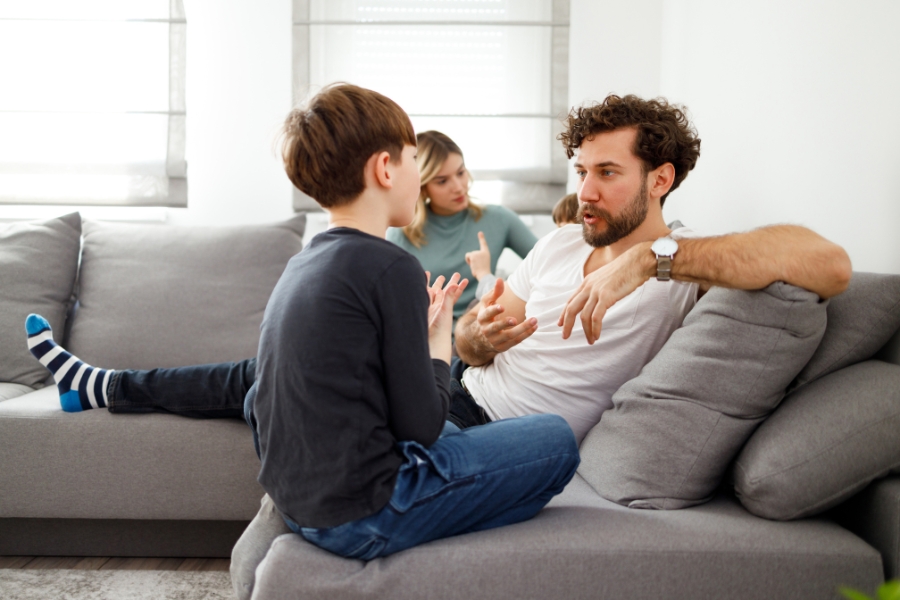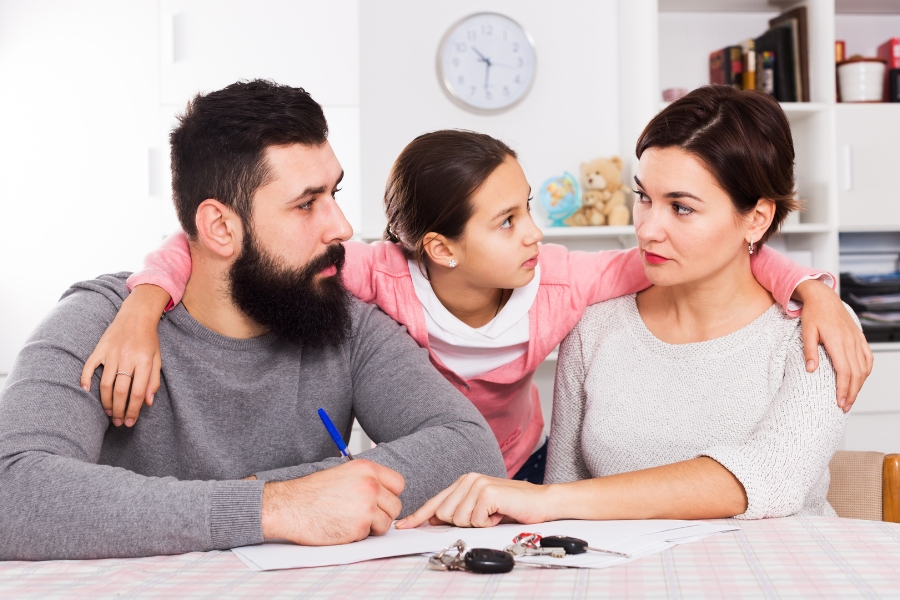What You Need to Know When Talking to Your Kids About Divorce

Many of the families we work with are at the very beginning of the divorce process, and oftentimes, parents have yet to tell their children that they’re getting a divorce.
This is certainly understandable, as talking to your kids about divorce is an inevitably difficult and uncomfortable thing to do.
Whether it’s dealing with the emotional impact of discussing divorce with kids – both on you and your children – or being concerned about how they’re going to respond, and how that may affect your relationship with them, there are a lot of things to worry about.
But if you have children and you’re getting divorced, you’re going to have to talk to them about it whether you like it or not. The sooner you do it, the better things will be for everyone as children inevitably sense something is happening in the family.
Luckily, one of the best ways of helping children cope with divorce is to simply talk to them about it.
However, these kinds of conversations can be extremely difficult, so you want to make sure that you’re approaching them in the right way.
With that in mind, this article offers guidance on how to approach the subject of divorce with your kids, no matter what stage of divorce you're in.
So, if you’re wondering how to explain divorce to children in the best way possible, this article will tell you everything you need to know.
Why Is Talking to Your Kids About Divorce So Difficult?

This may seem pretty obvious, but it goes a lot deeper than you might think.
What’s more, if you have a better understanding of why talking to your kids about divorce is so difficult, you’ll have greater context to understand and apply the advice we’re about to give.
So, before we offer our recommendations for discussing divorce with kids, let’s look at some of the reasons why it can be so tough to have these conversations.
Disruption of Security and Normalcy
Talking to kids about divorce is challenging because it disrupts their sense of security and normalcy.
Divorce changes the family structure they’re accustomed to, creating confusion and fear about their future.
Younger children, in particular, struggle to understand the abstract concept of divorce, which can lead to anxiety about losing a parent or even wrongly believing they are responsible for the separation.
Emotional Challenges for Parents
Parents themselves often face a mix of intense emotions, such as guilt, sadness, and anger, which makes it difficult to convey the situation calmly and reassuringly to their kids. This is especially true if one parent has not fully accepted the end of the marriage.
Balancing how much information to share is tough; oversharing can overwhelm children with adult issues, while under-sharing can leave them feeling uncertain and insecure.
Not Knowing How Kids Will React
Children's reactions to divorce can vary greatly depending on their age and personality.
Younger children might regress to behaviors typically shown by even younger kids, while older children may become withdrawn or act out with aggression.
This diversity in responses makes it difficult for parents to find a communication approach that works for all their children.
Feelings of Loss and Grief
Divorce often triggers feelings of loss and grief in children, similar to the emotions they might experience when a pet or someone close to them dies.
They grieve the loss of the family structure they once knew, which can lead to sadness, anger, and a sense of rejection.
Supporting children through these emotions requires patience and sensitivity, which can make the conversation even more complex.
Impact on Parent-Child Relationships
The way divorce is communicated can significantly impact your children’s relationships with both parents.
If the discussion isn't handled carefully, children might feel caught in the middle or pressured to take sides.
Ensuring that children feel loved and supported by both parents, even in the face of a contentious divorce, is crucial but it can also be extremely challenging.
Tips for Talking to Your Kids About Divorce

Now that you know why talking to your kids about divorce is so difficult, you’ve got a much better idea of what it takes to have these kinds of conversations.
But at this point, you’re probably wondering how to actually have that conversation with your kids.
With that in mind, below we’ve offered several tips for discussing divorce with kids, so you can help your children feel secure and loved during a time of significant upheaval.
State the Obvious
If you've been fighting a lot or spending less time together, for example, you should validate your child’s observations by describing the behaviors you know they’re seeing.
This may involve saying things like:
- “You can probably tell that your mom and I aren’t spending as much time together as we used to, and we haven’t been sleeping in the same room.”
- “You may have noticed that your mom and I haven’t been that happy with each other.”
- “You’ve probably noticed that your dad and I have been fighting a lot lately.”
Because the truth is they probably already know something is up, so it’s important to not wait too long and leave them worrying about what they are seeing, hearing, and feeling within the family.
And if you haven’t been upfront with them or refuse to talk about it, this can also make them feel like you’ve broken their trust.
So, for everyone’s sake, it’s important to be open and honest with them about the facts that are certain, preferably when both parents think it’s the right time.
Make It Age-Appropriate
While it’s important to be honest with your kids about what’s happening, some things just aren’t appropriate for children.
But luckily, you can still be honest with them without going into the unpleasant details.
In any case, make sure to tailor what you want to say to your kids, including how you respond to their questions, based on what’s suitable for their ages.
That being said, if you have children of vastly different ages, you might want to have separate conversations with each of them.
However, when it comes to sharing the news with your children, we highly recommend you do it together if you can and agree ahead of time on what information is considered age-appropriate.
Reassurance is especially important in these kinds of situations, especially for younger children.
For example, if your children know about another family’s divorce, which was ugly, you can make the intentional decision that yours will not be that way and tell your children you’re going to do things differently.
Put on a Happy Face
When talking to your kids about divorce, you should put on a happy face as much as possible.
Your kids should know that you're sad about the divorce, and it’s okay for you to express that emotion to them, but you don't want them to carry your sadness, because then they might think they can or should do something about it.
You should also avoid blaming your co-parent in front of your kids, as they'll feel like they have to take sides.
Consider Some Kind of Therapy
When you’re going through something as painful as a divorce, it's incredibly important to have someone in your corner with whom you can share all those painful feelings.
We always appreciate it when our clients are engaged in some kind of therapy, as it allows them to discuss their darkest thoughts and feelings in a way that’s less likely to spill over to the kids.
Here at Compassionate Divorce, we always encourage this sort of thing and can help you find an appropriate therapist, if need be.
Say Less, Listen More
When talking to your kids about divorce, you’ve got to allow them the space to say what they want to say and how they want to say it.
Try not to lead the conversation, thinking that there may be a right way for them to talk about their feelings and experiences.
Instead, it’s better to expand the conversation with more open-ended questions, like:
- What do you imagine will happen?
- Are you worried about anything?
- What are you thinking?
- What are you feeling?
You may not have all the answers to their questions, but that’s okay.
At least you’ve listened to them, have a better idea of what they’re going through, and you can now let them know that you’re working on it, and reassure them that they don’t need to worry and you will provide them with answers to their questions when you are able.
Pick a Time and Place
If you’ve yet to tell your kids that you’re getting divorced, it’s good to plan out a time and a place in which to do so.
Both parents should agree on where and when this will happen, and who is going to initiate the conversation.
It's also important that the two of you are on the same page about how the divorce will impact your kids, including where everyone is going to live, and when the divorce will occur (it can sometimes be helpful to tie it to an event in your kids’ lives, like the beginning of the school year). If you do not have all of the details worked out between you, let them know you will continue to work on the details and discuss it with them.
At any rate, when you do sit down and tell them about the divorce, ideally, both of you should remain available to them afterwards, together and/or separately, to debrief a bit.
Read Books About Divorce With Them
Thankfully, there is no shortage of age-appropriate books about divorce for children.
But you know your kids best, so when searching for books, you should take a look at reviews written by other parents to help guide your choices and take some time to research some titles that you know will be an appropriate fit for your kids’ ages and personalities.
One of the great things about books is that they can sometimes provide a springboard for parents to ask questions like, "Do you ever feel that way?"
This isn’t necessary, though, as just reading or hearing the story can be helpful in and of itself.
In any case, one book we highly recommend is Dear Mr. Henshaw, which was written by renowned children's author Beverly Cleary. The book's publisher recommends it for 8 to 12-year-olds.
It follows the life of Leigh Botts, a boy in the fourth grade, whose correspondence with a well-known author coincides with his parents' divorce.
The story continues for the next few years, as his correspondence with Mr. Henshaw turns into a journal, in which readers see life through Leigh's eyes. This includes the grief he feels, as well as the strengths he develops on the road to becoming a teenager.
The Compassionate Divorce Process
At Compassionate Divorce, we view divorce as more than just a legal and logistical process.
From our perspective, it’s just as much a mental health event as any other life changing event within the family.
With that in mind, our goal is to help you get through your divorce in the most efficient and mutually beneficial way possible.
We also want to help you gain the knowledge and skills you need to support your children during this difficult time and benefit you and your kids' mental health moving forward.
If you’d like to learn more about the Compassionate Divorce protocol, you can read our article, Breaking Up Amicably: The Benefits of Compassionate Divorce or contact us for more information.
